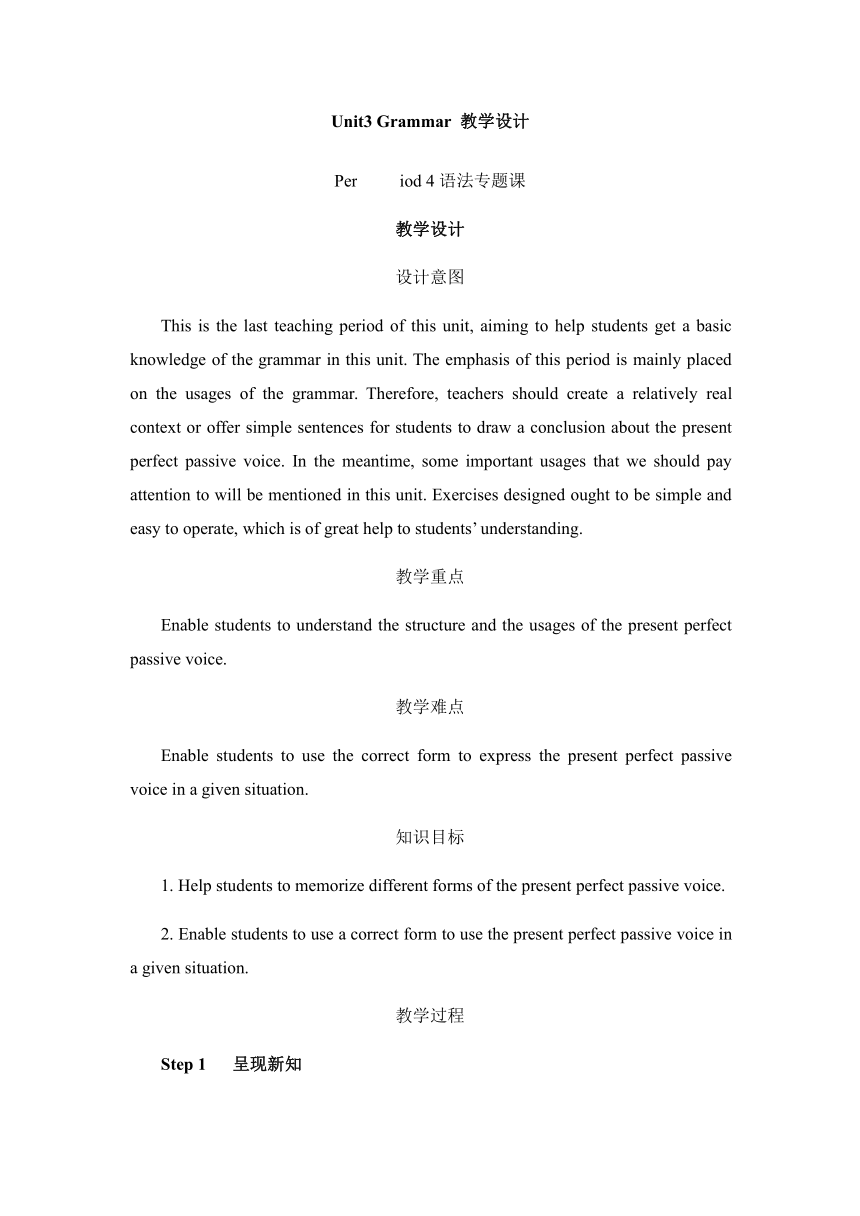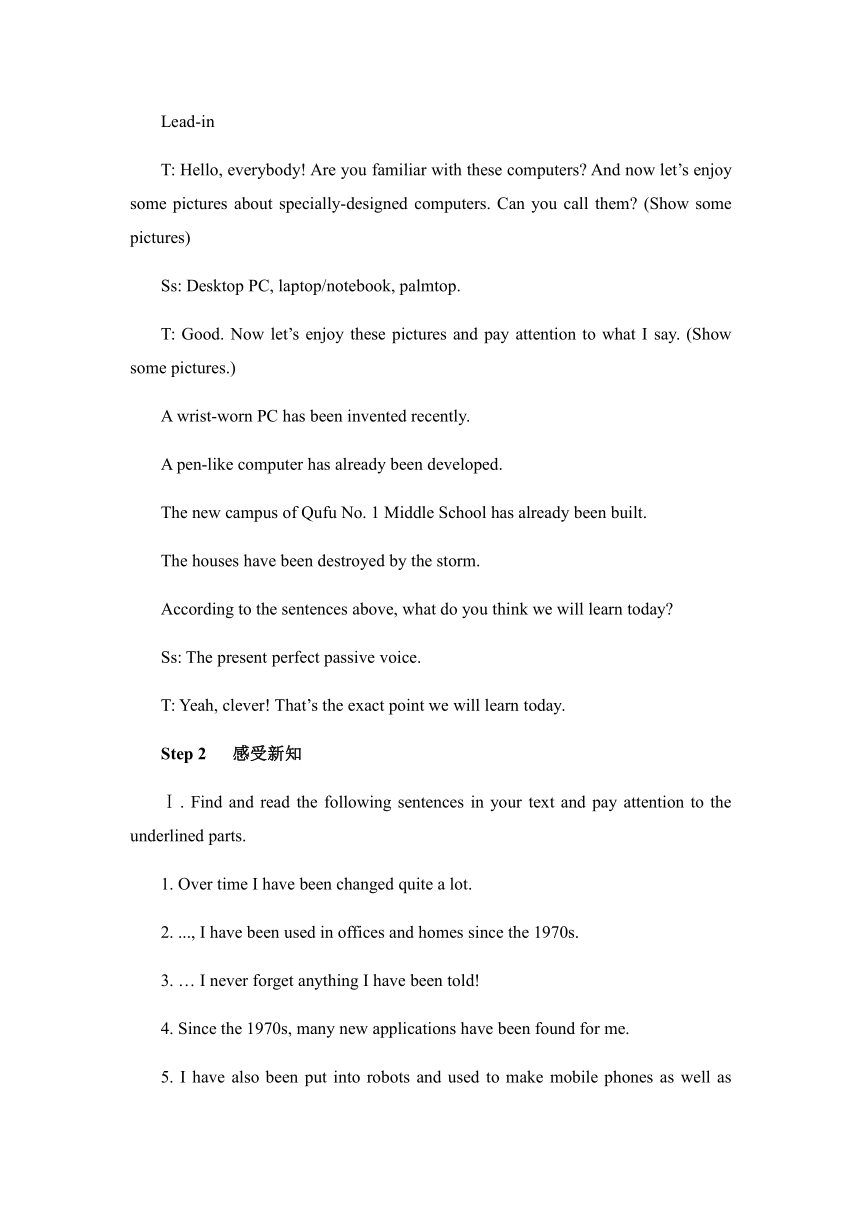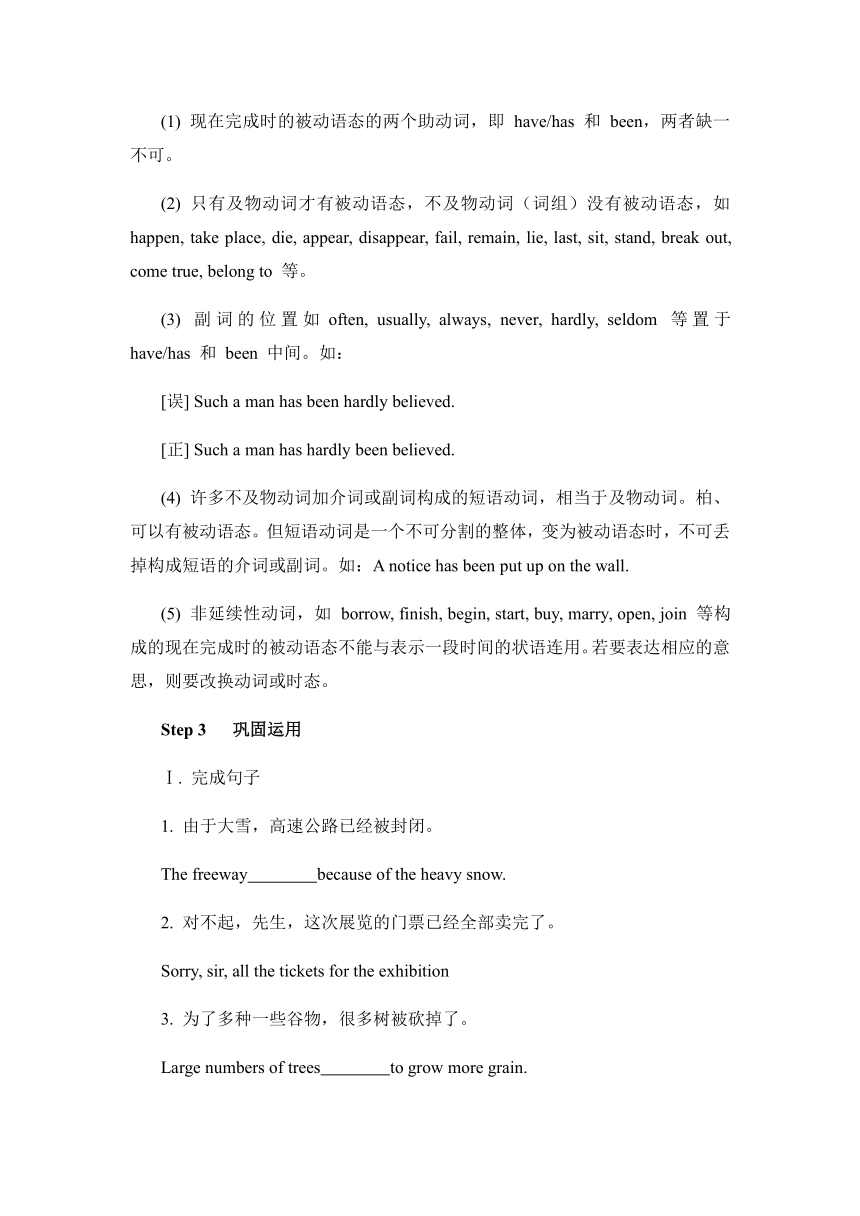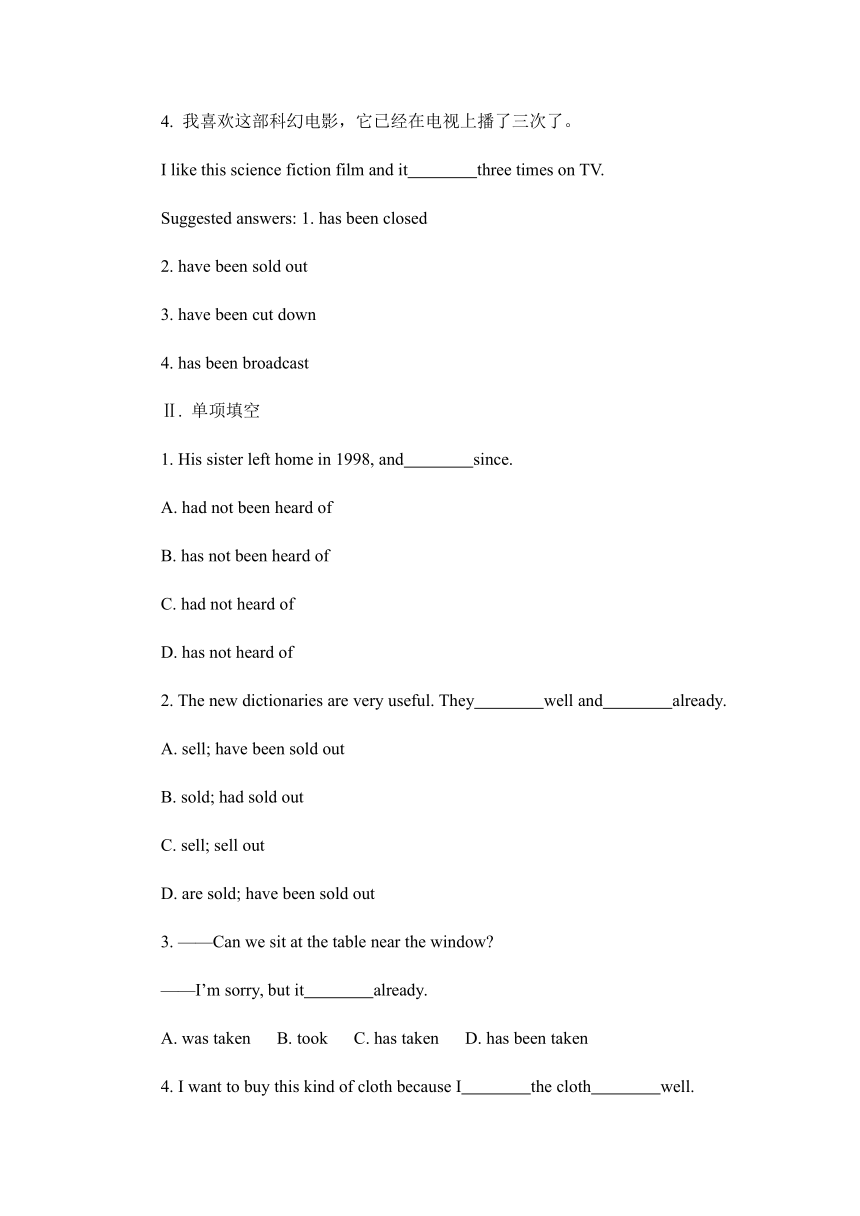人教课标版必修二Unit3 Computers Grammar优教教学设计
文档属性
| 名称 | 人教课标版必修二Unit3 Computers Grammar优教教学设计 |

|
|
| 格式 | zip | ||
| 文件大小 | 32.5KB | ||
| 资源类型 | 教案 | ||
| 版本资源 | 人教版(新课程标准) | ||
| 科目 | 英语 | ||
| 更新时间 | 2019-12-11 00:00:00 | ||
图片预览





文档简介
Unit3 Grammar 教学设计
Period 4语法专题课
教学设计
设计意图
This is the last teaching period of this unit, aiming to help students get a basic knowledge of the grammar in this unit. The emphasis of this period is mainly placed on the usages of the grammar. Therefore, teachers should create a relatively real context or offer simple sentences for students to draw a conclusion about the present perfect passive voice. In the meantime, some important usages that we should pay attention to will be mentioned in this unit. Exercises designed ought to be simple and easy to operate, which is of great help to students’ understanding.
教学重点
Enable students to understand the structure and the usages of the present perfect passive voice.
教学难点
Enable students to use the correct form to express the present perfect passive voice in a given situation.
知识目标
1. Help students to memorize different forms of the present perfect passive voice.
2. Enable students to use a correct form to use the present perfect passive voice in a given situation.
教学过程
Step 1 呈现新知
Lead-in
T: Hello, everybody! Are you familiar with these computers? And now let’s enjoy some pictures about specially-designed computers. Can you call them? (Show some pictures)
Ss: Desktop PC, laptop/notebook, palmtop.
T: Good. Now let’s enjoy these pictures and pay attention to what I say. (Show some pictures.)
A wrist-worn PC has been invented recently.
A pen-like computer has already been developed.
The new campus of Qufu No. 1 Middle School has already been built.
The houses have been destroyed by the storm.
According to the sentences above, what do you think we will learn today?
Ss: The present perfect passive voice.
T: Yeah, clever! That’s the exact point we will learn today.
Step 2 感受新知
Ⅰ. Find and read the following sentences in your text and pay attention to the underlined parts.
1. Over time I have been changed quite a lot.
2. ..., I have been used in offices and homes since the 1970s.
3. … I never forget anything I have been told!
4. Since the 1970s, many new applications have been found for me.
5. I have also been put into robots and used to make mobile phones as well as help with medical operations.
Ⅱ. Let students translate the sentences into Chinese and pay attention to different forms of the present perfect passive voice.
1. Two windows have been broken.
2. The car has not been repaired.
3. ——Have the cars been repaired?
——No, they haven’t.
4. How long has her work been finished?
Suggested answers: 1. 两个窗子被打破了。
2. 汽车还没有修好。
3. ——这些汽车修好了吗?
——不,还没有。
4. 她的工作完成多久了?
Ⅲ. Conclusion of the rules:
1. 现在完成时的被动语态的结构:have/has been done
2. 现在完成时被动语态的各种句式:
[肯定式] have/has + been + done
[否定式] have/has + not + been + done
[疑问式] Have/Has + 主语 + been + done?
[特殊疑问式]疑问词 + have/has + 主语 + been + done?
3. 使用现在完成时的被动语态要注意以下几点:
(1) 现在完成时的被动语态的两个助动词,即 have/has 和 been,两者缺一不可。
(2) 只有及物动词才有被动语态,不及物动词(词组)没有被动语态,如 happen, take place, die, appear, disappear, fail, remain, lie, last, sit, stand, break out, come true, belong to 等。
(3) 副词的位置如often, usually, always, never, hardly, seldom 等置于 have/has 和 been 中间。如:
[误] Such a man has been hardly believed.
[正] Such a man has hardly been believed.
(4) 许多不及物动词加介词或副词构成的短语动词,相当于及物动词。柏、可以有被动语态。但短语动词是一个不可分割的整体,变为被动语态时,不可丢掉构成短语的介词或副词。如:A notice has been put up on the wall.
(5) 非延续性动词,如 borrow, finish, begin, start, buy, marry, open, join 等构成的现在完成时的被动语态不能与表示一段时间的状语连用。若要表达相应的意思,则要改换动词或时态。
Step 3 巩固运用
Ⅰ. 完成句子
1. 由于大雪,高速公路已经被封闭。
The freeway because of the heavy snow.
2. 对不起,先生,这次展览的门票已经全部卖完了。
Sorry, sir, all the tickets for the exhibition
3. 为了多种一些谷物,很多树被砍掉了。
Large numbers of trees to grow more grain.
4. 我喜欢这部科幻电影,它已经在电视上播了三次了。
I like this science fiction film and it three times on TV.
Suggested answers: 1. has been closed
2. have been sold out
3. have been cut down
4. has been broadcast
Ⅱ. 单项填空
1. His sister left home in 1998, and since.
A. had not been heard of
B. has not been heard of
C. had not heard of
D. has not heard of
2. The new dictionaries are very useful. They well and already.
A. sell; have been sold out
B. sold; had sold out
C. sell; sell out
D. are sold; have been sold out
3. ——Can we sit at the table near the window?
——I’m sorry, but it already.
A. was taken B. took C. has taken D. has been taken
4. I want to buy this kind of cloth because I the cloth well.
A. have told; washed
B. have been told; washes
C. have been told; washed
D. was told; washed
Suggested answers: 1. B 2.A 3.D 4.B
Step 4 拓展
I. Correct the following sentences and conclude the important usages of the present perfect passive voice. Show them on the screen.
1. A personal computer has bought by us.
2. What has been happened to you?
3. Our computer just has been joined to the Internet.
4. The child has been taken good care by Grandma Wang all these years.
5. How long has the book been borrowed?
Suggested answers:
1. A personal computer has been bought by us.
2. What has happened to you?
3. Our computer has just been joined to the Internet.
4. The child has been taken good care of by Grandma Wang all these years.
5. How long has the book been kept?
Ⅱ. Consolidation
1. 用括号内动词或词组的适当形式填空
(1) More than 5,000 used bikes (collect) since the two brothers set up the organization,
(2) Since the cause of this disease (discover), now we need to develop the medicine to treat it.
(3) Over the past ten years, this town (hit) twice by earthquakes.
(4) —Will the lecture be held at 4 o’clock this afternoon?
—No. It (put off) till tomorrow afternoon.
(5) Her novel is very popular among people of all ages; so far it
(translate) into 25 languages.
Suggested answers: (1) have been collected
(2) has been discovered
(3) has been hit
(4) has been put off
(5) has been translated
2. 单项填空
(1) All the preparations for the task , and we’re ready to start.
A. completed
B. complete
C. had been completed
D. have been done
(2) ——How long at this job?
——Since 1990.
A. were you employed
B. have you been employed
C. had you been employed
D. will you be employed
(3) When and where to go for the on-salary holiday yet.
A. are not decided
B. have not been decided
C. is not being decided
D. has not been decided
(4) Betty injured since last Saturday.
A. has been B. was C. is D. has
(5) That book into at least 20 foreign languages.
A. has said to be translated
B. has been said to have translated
C. is said that it had been translated
D. is said to have been translated
(6) ——Did you move into the new house?
——No. The rooms yet.
A. were being painted
B. are painting
C. have not painted
D. have not been painted
Suggested answers: (l) D (2) B (3) D (4) A (5) D (6) D
课堂小结
In this period, we have learned the present perfect passive voice. Pay attention to the structures when you use them.
课后作业
Recite the sentences from the text, revise the present perfect passive voice after class and try to grasp the different forms.
板书设计
Left Side of the Blackboard Central Part of the Blackboard Right Side of the Blackboard
1. 构成:have/has been done2. 现在完成时被动语态的各种句式:[肯定式] have/has + been + done[否定式] have/has + not + been + done[疑问式] Have/Has + 主语 + been + done?[特殊疑问式]疑问词 + have/has + 主语 + been + done? 1. 使用现在完成时的被动语态要注意以下几点:1. 结构2. 只有及物动词才有被动话态3. 副词的位置4. 不及物动词加介词或副词构成的短语动词5. 非延续性动词,如borrow, finish, begin, start, buy, marry, open, join 等构成的现在完成时的被动语态不能与表示一段时间的状语连用 Homework:1. Recite the sentences. from the text.2. Revise the present perfect passive voice after class, and try to grasp the different forms.
